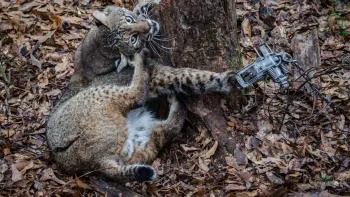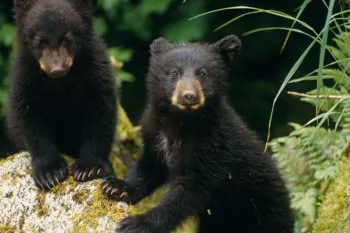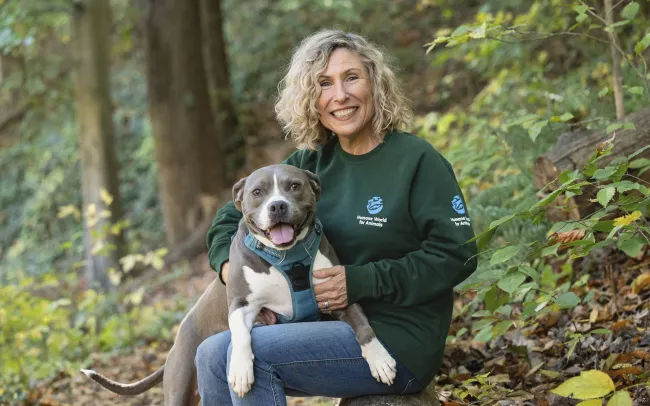Floridians face a critical decision on their November ballots, one that will shape the future of wildlife, land and the legacy they leave as voters for generations to come. That’s how significant—and dangerous—Amendment 2 is. The seemingly innocuous measure has been characterized by lobbyists as a way to protect hunting and fishing interests, but in reality, it goes so much further, setting a dangerous precedent for how wild animals are viewed and treated.
To be clear, hunting and fishing are not under threat in the state; Florida law already protects the right to hunt and fish. But Amendment 2 seeks to enshrine and elevate cruel and inhumane methods to the level of a constitutional public right on par with freedom of speech.
Similar measures to Amendment 2 have been popping up around the country, pushed largely by trophy hunting special interest groups, including the Congressional Sportsmen’s Foundation, the National Rifle Association and the International Order of T. Roosevelt. The wording of Amendment 2 is straight out of their playbook, in which lawmakers are advised to include language allowing the use of “traditional methods,” which has no formal definition. Such a phrase tends to be used as a kind of code to mean unpopular practices that fewer and fewer Americans actually support or participate in. “Traditional methods” could include the use of steel-jawed leghold traps and strangling wire snares to trap animals, methods which are excruciating and can cause immense suffering for the animals in their hold before trappers come to kill them. “Traditional methods” might also include using hounds to chase and corner wild animals, or baiting them with fetid or deadly foods, only to be shot at close range.
Under this intentionally vague and undefined term, archaic devices that have long been prohibited, such as the use of spears to hunt, could potentially become legal again. Perhaps our society has moved away from such “traditional methods” for good reason—an evolved moral compass and expanded sense of compassion for the wild creatures who enrich our lives and enliven our land.
/iStock.com
Vote NO on Amendment 2
And it’s not just outdated and unpopular forms of hunting that could come back. Amendment 2 could also impact current protections for Florida’s marine life and make it more difficult to enact new measures to protect dolphins, manatees, sea turtles and other marine species. By enshrining the use of “traditional methods” of fishing in the state constitution, Amendment 2 could override these protections, leading to a resurgence of dangerous, destructive practices in water as well as on land. Such a move would dismantle Florida’s years-old position as a leader in marine conservation, putting vulnerable species in Florida’s waters once more at high risk.

Hildegard Williams/Alamy Stock photo
There’s a reason for pretty much everyone to oppose Amendment 2. Here’s another: Amendment 2 omits private property protections, which were originally included in its language but later removed. If passed, Amendment 2 could allow hunters to trespass on private land in pursuit of animals, potentially creating situations where firearms are used near homes and families without the property owner’s knowledge or consent. By removing these crucial protections, the amendment threatens to undermine another basic right, and one that genuinely deserves the respect of all—the right to control what happens on your own land. Families across the state could be forced to contend with unwelcome intrusions from hunters, putting their safety and privacy at risk, and offending their environmental and animal protection values.
Worse still, by mandating that hunting be the “preferred means” of wildlife management, Amendment 2 effectively sidelines proven, nonlethal measures of human-wildlife conflict prevention in favor of hunting instead. Undoubtedly, the Florida Fish and Wildlife Conservation Commission would be pressured to open a trophy hunting season on Florida’s black bears, distracting the agency from dedicating more resources toward improved public management of trash and other food attractants, which are the root of nearly all negative human-bear interactions.
Between the purposely vague terms of “traditional methods,” and the “preferred means” mandate for hunting, Amendment 2 will create a legal nightmare. Any future attempts by the state commission to enact further restrictions on hunting or fishing, even if done to protect wildlife, could result in legal challenges from groups seeking to protect their constitutional right to use destructive or “traditional” methods. This would essentially freeze the commission’s ability, or at least significantly diminish its willingness, to consider and adopt regulations to meet the changing needs of Florida’s wildlife.
It’s clear that Amendment 2 isn’t about protecting hunting and fishing interests—they’re already protected. Less than 1% of Florida residents held a paid hunting license in 2024, so who is this amendment protecting? Does Florida need to enshrine a recreational activity enjoyed by such a small percentage of the population in the state’s most authoritative governing document? It raises the question: Which niche activity will special interest groups lobby to protect under the constitution next? Amendment 2 is a slippery slope that could create a domino effect, turning the state’s constitution into a joke.
Amendment 2 is ultimately about the rollback of wildlife protections in favor of outdated and inhumane practices at the expense of everyone who cares about shaping a more humane future for animals, everyone who cares about being able to have control over what happens on their lands, and everyone who cares about maintaining Florida’s delicate ecosystems and environment for the good of people and animals. It is wholly undeserving of consideration as a constitutional measure. Voting no on Amendment 2 is the only way Florida voters can stop this dangerous proposal and stand up for what’s right.
Follow Kitty Block @HSUSKittyBlock.




